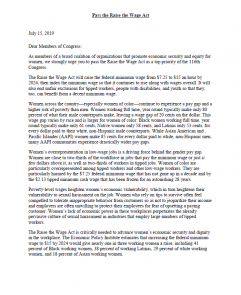Abortion rights, women of color, and LGBTQIA+ people are under attack. Pledge to join us in fighting for gender justice.
As members of a broad coalition of organizations that promote economic security and equity for women, we strongly urge you to pass the Raise the Wage Act as a top priority of the 116th Congress.
The Raise the Wage Act will raise the federal minimum wage from $7.25 to $15 an hour by 2024, then index the minimum wage so that it continues to rise along with wages overall. It will also end unfair exclusions for tipped workers, people with disabilities, and youth so that they, too, can benefit from a decent minimum wage.
Women across the country—especially women of color—continue to experience a pay gap and a higher risk of poverty than men. Women working full time, year round typically make only 80 percent of what their male counterparts make, leaving a wage gap of 20 cents on the dollar. This wage gap varies by race and is larger for women of color: Black women working full time, year round typically make only 61 cents, Native women only 58 cents, and Latinas only 53 cents, for every dollar paid to their white, non-Hispanic male counterparts. While Asian American and Pacific Islander (AAPI) women make 85 cents for every dollar paid to white, non-Hispanic men, many AAPI communities experience drastically wider pay gaps.
Women’s overrepresentation in low-wage jobs is a driving force behind the gender pay gap. Women are close to two-thirds of the workforce in jobs that pay the minimum wage or just a few dollars above it, as well as two-thirds of workers in tipped jobs. Women of color are particularly overrepresented among tipped workers and other low-wage workers. They are particularly harmed by the $7.25 federal minimum wage that has not gone up in a decade and by the $2.13 tipped minimum cash wage that has been frozen for an astonishing 28 years.
Poverty-level wages heighten women’s economic vulnerability, which in turn heightens their vulnerability to sexual harassment on the job. Women who rely on tips to survive often feel compelled to tolerate inappropriate behavior from customers so as not to jeopardize their income and employers are often unwilling to protect their employees for fear of upsetting a paying customer. Women’s lack of economic power in these workplaces perpetuates the already pervasive culture of sexual harassment in industries that employ large numbers of tipped workers.
The Raise the Wage Act is critically needed to advance women’s economic security and dignity in the workplace. The Economic Policy Institute estimates that increasing the federal minimum wage to $15 by 2024 would give nearly one in three working women a raise, including 41 percent of Black working women, 38 percent of working Latinas, 29 percent of white working women, and 18 percent of Asian working women.
Women and people of color have been left behind by our economy and our policies far too often, for far too long. Adopting the Raise the Wage Act would mark a crucial step toward ensuring they can work with equity, dignity, and safety. There is no more fitting way to begin this historic Congress than by making real, concrete progress in ensuring all women receive adequate pay.
We urge you to prioritize the Raise the Wage Act in the 116th Congress by swiftly passing this legislation. If you have any questions, please do not hesitate to contact Emily Martin, Vice President for Education & Workplace Justice at the National Women’s Law Center, at (202) 588-5180.
Sincerely,

